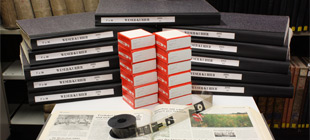Microfilm archive and German press catalog

About us
Bremen State and University Library is well known for its vast micro-format collection of historical German-language newspapers, which currently spans approximately 35,000 microfilms and 25,000 microfiches.
Our extensive collection of Bremen newspapers has also been micro-formatted and can be accessed at the Microfilm Archive. Micro-formatting protects the original materials, occupies less floor space, and ensures that resources are easy to access and utilize.
In 1957 the former State Library established the Deutsche Presseforschung at the SuUB. This specialist institution dedicated to researching this rich historical resource has since evolved into the "Institut für historische Publizistik, Kommunikations- und Medienwissenschaft" at the Faculty of Cultural Studies at the University of Bremen.
Use of the microfilms
Two microfilm scanners are available for the use of the films in the reading room on level 1. Pre-registration is absolutely necessary.
Please contact us by phone, email or in person.
We will provide the microfilms, introduce you to the use of the films and equipment and advise you on questions regarding newspapers and their locations.
You cannot find the title you are looking for via our catalogue?
Newspaper index
You will find more titles in the list of newspapers. These will gradually be added to the online catalogue.
A list of newspapers and similar periodicals (PDF)
German press catalog
This catalog was established in 1954 by the former Bremen State Library and provides a complete catalog of German press publications.
The catalog details the press holdings of libraries, archives, publishers and printing companies (including both original and microformat materials).Approximately 60,000 German-language titles are indexed in the catalog by title and location. The catalog was originally conceived as a central reference tool to manage the circulation of materials between German libraries, a task now administered by the ZDB, and currently provides a fallback option when materials cannot be located using the ZDB.



